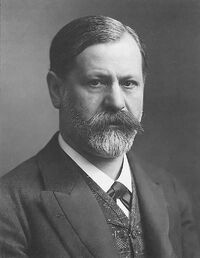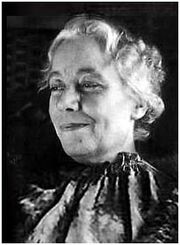Assessment |
Biopsychology |
Comparative |
Cognitive |
Developmental |
Language |
Individual differences |
Personality |
Philosophy |
Social |
Methods |
Statistics |
Clinical |
Educational |
Industrial |
Professional items |
World psychology |
Clinical: Approaches · Group therapy · Techniques · Types of problem · Areas of specialism · Taxonomies · Therapeutic issues · Modes of delivery · Model translation project · Personal experiences ·
This article is concerned with the clinical issues relating to narcissism. For an article on of narcissism in the generic sense see; Narcissism

Narcissus, the Greek hero after whom narcissism is named, became obsessed with his own reflection.
The term narcissism means love of oneself, and refers to the set of character traits concerned with self-admiration, self-centeredness and self-regard. The name was chosen by Sigmund Freud, from the Greek myth of Narcissus, who was doomed to fall in love with his own reflection in a pool of water.
Whilst everyone is narcissistic to some degree, extreme narcissism can be highly dysfunctional, and is classified as a pathology called Narcissistic Personality Disorder.
Definition[]
Narcissism is a term first used in relation to human thought and behavior by the Austrian physician and psychiatrist Sigmund Freud.
Narcissism is a set of character traits concerned with self-admiration, self-centeredness and self-regard.
Everyone has some narcissistic traits. However, narcissism can also manifest in an extreme pathological form in some personality disorders such as the Narcissistic Personality Disorder wherein the patient overestimates his abilities and has an excessive need for admiration and affirmation. This may be present to such a degree that it severely damages the person's ability to live a productive or happy life because the traits manifest as severe selfishness and disregard for the needs and feelings of others.
The Narcissistic Personality Inventory (NPI) divides narcissism into seven components: superiority, exhibitionism, entitlement, vanity, authority, exploitativeness and self-sufficiency. "Narcissists generally crave attention, are overconfident of their abilities, lack empathy and can evince erratic behavior. However, they are also well-liked, especially on first meeting, are extroverted and perform well in public." -Pinksy [1]
In The Beginning - The Psychoanalysts[]
Freud[]

Sigmund Freud, 1907
- Main article: Sigmund Freud
The Austrian physician Sigmund Freud (1856-1939), a neurologist turned psychiatrist, introduced the concept of narcissism in his 1914 essay On Narcissism: An Introduction,[1].
The Freudian theory of Narcissism[]
Primary narcissism[]
In his essay, 'On Narcissism: An Introduction', Freud suggested that exclusive self-love might not be as abnormal as previously thought, and might even be a common component in the human psyche. He argued that narcissism "is the libidinal compliment to the egoism of the instinct of self-preservation", or, more simply, the desire and energy that drives our instinct to survive. He called this: Primary Narcissism.
According to Freud we are not born with a sense of ourselves as individuals, or ego. The ego only develops during infancy and the early part of childhood, as the outside world, usually in the form of parental controls and expectations, intrudes upon primary narcissism, teaching the individual about the nature and standards of his social environment from which he can form the ideal ego, an image of the perfect self towards which the ego should aspire.
Freud regarded all libidinous drives as fundamentally sexual and suggested that ego libido (libido directed inwards to the self) cannot always be clearly distinguished from object-libido (libido directed to persons or objects outside of ourselves).
An aspect frequently associated with Primary Narcissism appears in an earlier essay, 'Totem and Taboo' [2]. where he describes his observations of children and primitive people, which he called "magical thinking". An example of magical thinking would be believing that you can have an effect on reality by wishing or willpower. This demonstrates a belief in the self as powerful and able to change external realities, which Freud believed was part of normal human development.
Secondary narcissism[]
According to Freud, secondary narcissism is a pathological condition which occurs when the libido withdraws from objects outside of the self. Freud further claimed that it is an extreme form of the narcissism that is part of all of us.
Narcissism, relationships and self worth[]
According to Freud, to care for someone is to convert ego-libido into object-libido by giving some self-love to another person, which leaves less ego-libido available for primary narcissism and protecting and nurturing the self. When that affection is returned so is the libido, thus restoring primary narcissism and self worth. Any failure to achieve, or disruption of, this balance causes psychological disturbances. In such a case primary narcissism can only be restored by withdrawing object-libido (also called, object-love), to replenish ego-libido.
According to Freud, as a child grows, and his ego develops, he is constantly giving of his self-love to people and objects, the first of which is usually his mother. This diminished self-love should be replenished by the affection and caring returned to him.
Horney[]
- Main article: Karen Horney

Karen Horney
German physician and psychiatrist Karen Horney (1885-1952), began to develop her own theory of psychoanalysis in the late 1930s. Though acknowledging Freud as the founder of psychoanalysis, she was critical of his work, arguing that personality was shaped mainly by social, cultural and environmental factors. She felt that Freud was wrong to assume that the relationships, attitudes and feelings common in his culture and times were largely driven by biological factors and could be applied universally.
Horney saw narcissism quite differently from Freud, Kohut, and other mainstream psychoanalytic theorists, in that she did not posit a primary narcissism but saw the narcissistic personality as the product of a certain kind of early environment acting on a certain kind of temperament. For her, narcissistic needs and tendencies are not inherent in human nature.
Narcissism is different from her other major defensive strategies or solutions in that it is not compensatory. Self-idealization is compensatory in her theory, but it differs from narcissism. All of the defensive strategies involve self-idealization, but in the narcissistic solution it tends to be the product of indulgence rather than of deprivation. The narcissist's self-esteem is shaky, however, because it is not based on genuine accomplishments.[3]
Kohut[]
- Main article: Heinz Kohut
Viennese physician and psychiatrist Heinz Kohut, M.D. (1913 - 1981) is best known for his development of Self Psychology, a school of thought within psychodynamic/psychoanalytic theory.
Kohut explored further the implications of Freud's perception of narcissism.
He said that a child will tend to fantasize about having a grandiose self and ideal parents. He claimed that deep down we all retain a belief in our own perfection, and the perfection of anything we are part of, as we mature, grandiosity gives way to self-esteem, and the idealization of the parent become the framework for core values. It is when trauma disrupts this process that the most primitive and narcissistic version of the self remains unchanged. Kohut called this condition Narcissistic Personality Disorder.
He suggested narcissism as part of a stage in normal development, in which caregivers provide a strong and protective presence for the child to identify with that reinforces the child's growing sense of self by mirroring his good qualities. If the caregivers fail to provide this adequately, the child grows up with a brittle and flawed sense of self.[4]
He also saw beyond the negative and pathological aspects of narcissism, believing it to be a component in the development of resilience, ideals and ambition once it has been transformed by life experiences or analysis.[5]
Kernberg[]
- Main article: Otto Kernberg
Other forms of narcissism[]
Acquired situational narcissism[]
Acquired Situational Narcissism is a form of narcissism which develops in adolescence or adulthood, brought on by wealth, fame and the other trappings of celebrity. It was coined by Robert B. Millman, professor of psychiatry at the Weill Medical College of Cornell University.
ASN differs from conventional narcissism in that it develops after childhood and is supported by the celebrity-obsessed society: fans, assistants and tabloid media all play into the idea that the person really is vastly more important than other people.
The person with ASN may suffer from unstable relationships, substance abuse and erratic behaviour.
Gender narcissism[]
Gender narcissism is a relatively new concept, mentioned by Dr. Gerald Schoenwolf[6], with reference to both males and females.
The concept builds on Freud's theories of penis envy and the castration complex. Chiefly that an over-emphasis or over-perception of gender and gender difference in childhood can lead to either a devaluation or an over-valuation of one's gender in later life.
Dr. Schoenwolf in particular suggests that the emergence of the feminist personality, with gonadal-centric views, and female gender narcissism are synonymous.[How to reference and link to summary or text]
Sexual narcissism[]
Sexual narcissism is the erotic preoccupation with oneself as a sexual being: a desire to merge sexually with a mirror image of oneself. Sexual narcissism can also be an egocentric pattern of sexual behavior, defined by David Farley Hurlbert and Carol Apt [7] as an inability to experience intimacy combined with a fixation on the sexual act, using high sexual esteem to compensate for low general self esteem. This is believed to be more common in men than in women and is suggested to be the basis of sex addiction.
References[]
- ↑ Freud, Sigmund, On Narcissism: An Introduction, 1914
- ↑ Freud, Sigmund, Totem and Taboo, 1913
- ↑ Paris, Bernard J, Personality and Personal Growth, edited by Robert Frager and James Fadiman, 1998
- ↑ Kohut, Heinz, The Analysis of the Self, 1971
- ↑ Kohut, Heinz, Forms and Transformations of Narcissism, 1966
- ↑ Schoenwolf, Gerald, PH.D Gender Narcissism and its Manifestations
- ↑ Hurlbert, D.F., Apt, C., Sexual narcissism and the abusive male.
See also[]
- Acquired situational narcissism
- Antisocial personality disorder
- Autoeroticism
- Culture of narcissism
- Egocentrism
- Grandiosity
- Healthy narcissism
- History of narcissism
- Malignant narcissism
- Megalomania
- Narcissistic abuse
- Narcissistic defences
- Narcissistic injury
- Narcissistic mortification
- Narcissistic neurosis
- Narcissistic object choice
- Narcissistic parents
- Narcissistic personality disorder
- Narcissistic rage
- Narcissistic rage and narcissistic injury
- Narcissistic supply
- Narcissism of small differences
- Narcissistic withdrawal
- Primary narcissism
- Secondary narcissism
- Selfishness
- Self reference
- Superiority complex
External links[]
- A Field Guide To Narcissism, Carl Vogel - feature writer for Psychology Today magazine
- The Patterns Of A Narcissist In A Romantic Relationship, Jon Rhodes
- The Impact of Narcissism on Leadership and Sustainability, Bruce Gregory Ph.D.
- A routine diagnosis investigated, Dr Frans Gieles, 2002
- Narcissism can be as much a hindrance as a help to relationships, Kim Carlyle
- Voicelessness: Narcissism - on being raised by narcissists, Richard Grossman, Ph.D.
| This page uses Creative Commons Licensed content from Wikipedia (view authors). |
